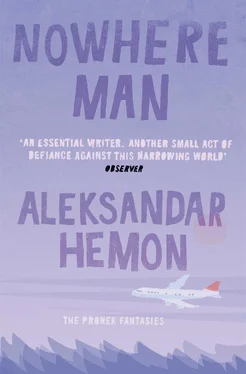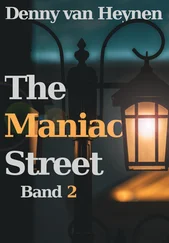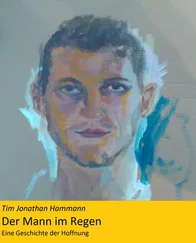Yours.
Mirza
P.S. Happy New Year!

CHICAGO, SEPTEMBER 1/
OCTOBER 15, 1995
The Slumbering guard, about to slide off his chair, had his fingers on the holstered revolver. Pronek passed him by, pushed the grill door aside, and stepped into the elevator. The elevator was rife with a woman’s fragrant absence: peachy, skinny, dense. Pronek imagined the woman who might have exuded that scent, and she was worth a stare. She was tall and rangy and strong-looking; her hair was black and wiry and parted in the middle; she had black eyes and a sulky droop to her lips. She took a cigarette out of her purse, which was heavier than it needed to be, turned to him and said, expecting a friendly lighter: “I’ve been searching for someone, and now I know who.”
Pronek’s eyes narrowed as he looked at the space where the woman would have stood, and he saw himself through her eyes: tall, formerly lanky, so his relaxed movements did not match his fat-padded trunk; his head almost shaved, marred by a few pale patches (he cut his own hair); a gray sweatshirt that read ILLINOIS across his chest; worn-out jeans with a few pomegranate-juice splotches; and boots that had an army look, save for the crack in his left sole — September rains had already soaked his left sock. As he stepped out of the elevator, a whiff of the fragrant cloud followed him out. He stood in the empty hall: on the left and on the right, there were rows of doors standing at attention in the walls. Above a door on the right was a lit exit sign. Pronek made an effort to remember the position — in case he was too much in a hurry to wait for an elevator. He was looking for office number 909 and decided to go right. The colorless carpet muffled his careful steps. The elbow-shaped hall reeked of bathroom ammonia and sweet cigars, and the fragrant whiff dissipated in it. Pronek tried to open the bathroom door — green, sturdy, with a silhouette of a man — but it was locked. When he pushed the door with his shoulder, it rattled: he could break it open without too much force. He figured that there would be fire stairs behind a milky bathroom window, and that the alley would lead to Michigan Avenue, where he could safely disappear in the street mass.
All of a sudden, Pronek became aware of a sound that had been in his ears for a while but not quite reaching his brain: it was a smothered, popping sound — first one, then two — with a click at the end. Much like the sound of a gun with a silencer. Pronek’s muscles tensed and his heart started thumping like a jungle drum — he was convinced that the hall was echoing his accelerating pulse. He felt his eyebrows dewing, thick loaves of pain forming in his calves. He tiptoed past the doors: 902 (Sternwood Steel Export); 904 (Marlowe Van Buren Software); 906 (Bernard Ohls Legal Services); 908 (empty); 910 (Riordan & Florian Dental Office) — the popping, along with the murky light, came from behind the dim glass of 910. Pronek imagined bodies lined up on the floor facedown, some of them already dead, with their blood and hair on the wall, their brains bubbling on the carpet. They were shivering, waiting for a quiet man with a marble-gray face to pop them in their napes, knowing they would end up in unmarked graves. They reacted to the surprising bullet with a spasm, then death relaxation, then their blood placidly soaking the carpet. There was another pop. There had been at least six of them, and Pronek reckoned that the killer must be running out of bullets. It was risky, it was none of his business, so he twisted the door handle and peeked in.
A large man in a yellow helmet was pressing his orange staple gun against the far wall. He sensed Pronek and turned around slowly. His skin was pale and he needed a shave. He had dirty overalls and a green shirt underneath, with tiny golf balls instead of buttons. He stood firmly facing Pronek, his jaw tense, as if expecting a punch, his staple gun pointing to the floor. “Can I help you with something?” he said, frowning under his helmet. Pronek could see his eyebrows almost encountering each other above his nose. “Sorry,” Pronek said. “I look for the office 909.”
Office 909 had a sign that read GREAT LAKES EYE and a black-and-white eye with long, upward-curling eyelashes. Pronek hesitated for a moment before knocking at the door — his fingers levitated, angled, in front of the eye. Pronek knocked, using three of his knuckles, the glass shook perilously, then he opened the door and entered an empty waiting room. There was another door, closed, and there were magazines strewn on the few chairs, even on the musty floor, as if someone had searched through them all. The waiting room was lit by a thin-necked lamp in the corner, leaning slightly as if about to snap. There was an underdeveloped cobweb without a spider in the upper left corner. A picture of an elaborate ocean sunset — as if somebody lit a match under the water — hung on the opposite wall. ACAPULCO, it said in the lower right corner, WHERE YOU WANT TO DREAM. Pronek stood in front of the picture, imagining himself playing the guitar on a beach in Acapulco, tears welling up in his eyes.
The door opened and a man and a woman came out. They were laughing convivially with someone who remained invisible. The man — tall and black — put on a fedora with a little bluish feather, which went perfectly with his dapper navy blue suit, snug on his wide shoulders, and his alligator boots with little explosions on his toes. The woman was pale and slim, with blond boyish hair and a pointy chin. She had a tight, muscular body, like a long-distance runner, and a beautiful lean neck. She kept the tip of her finger on her chin as she listened to the man inside, who said: “What you wanna do is get some pictures.” Pronek imagined touching gently the back of her neck, below the little tail of hair on her nape, and he imagined the tingle that would make her shudder. “You bet,” the woman said, stepping out of the waiting room, barely glancing at Pronek. “You got yourself a client, Owen,” the dapper man said, following the woman, and a head sprung out of the door, eyes bulging to detect Pronek. “Gee, a client,” the head said, and the couple giggled as they closed the door. “Why don’t you come in.”
Pronek followed the man inside, closing the croaking door behind him. The room was bright, its windows looking at Grant Park and the dun lake beyond it, waves gliding toward the shore. There was a sofa with a disintegrating lily pattern and a coffee table with a chess board on it. Pronek landed in the sofa and the fissures between the cushions widened and gaped at Pronek’s thighs.
“My name is Taylor Owen,” the man said.
“I am Pronek,” Pronek said. “Jozef Pronek.”
“Good to meet you, Joe,” Owen said.
Owen had sweat shadows under his armpits and a hump on his back, as if there were a pillow under his beige shirt. His tie was watermelon red, tightly knotted under his Adam’s apple, which flexed sprightly like a Ping-Pong ball as he spoke. He was bald, with a little island of useless hair above his forehead and a couple of grayish tufts fluffing over his ears. He sat behind a narrow desk piled with papers, the back of his head touching the wall as he leaned in his chair.
“I called. I talked to somebody,” Pronek said, “about the job. I thought you need the detective.”
“The detective?” Owen chortled. “Lemme guess: you seen a few detective movies, right? The Bogart kind of stuff?”
“No,” Pronek said. “Well, yes. But I know it is not like that.”
Читать дальше













